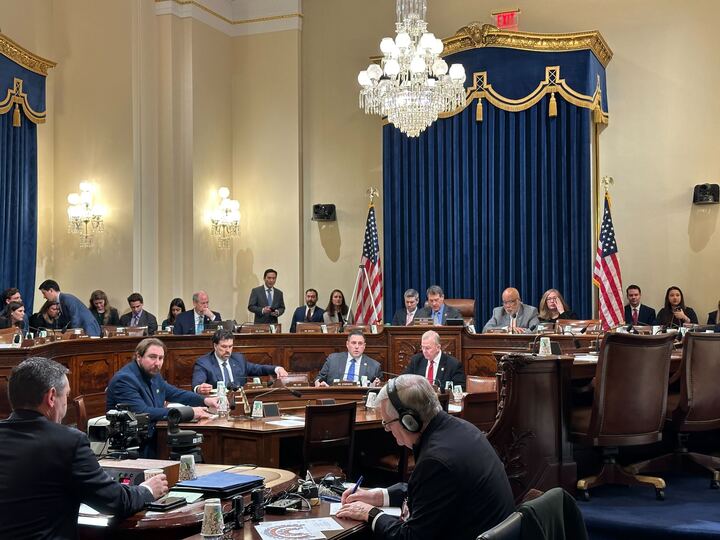WASHINGTON — Republican lawmakers made a concerted effort on Wednesday to find grounds to impeach Secretary of Homeland Security Alejandro N. Mayorkas by focusing on how border enforcement policies have increased drug trafficking.
The hearing, led by Rep. Mark Green (R-Tenn.), chair of the House Committee on Homeland Security, underscored tying border policies to the nation’s drug trafficking landscape, noting that the flow of hard drugs such as fentanyl and methamphetamine coming through the southern border have increased dramatically.
“I can tell you as of the third quarter of 2023, Montana is on track to have seized nearly a half million dosage units of fentanyl and another 200 pounds of methamphetamine,” said Montana Attorney General Austin Knudsen (R), one of the witnesses called by Republicans. “Cartels trafficked 100% of that across the southern border.”
In reality, the surge of fentanyl can’t be solely tied to migrants, rather it stems from a myriad of factors.
“Their intent is not to engage in things like drug trafficking or violent crime,” Donald Moynihan, a professor at Georgetown University’s school of public policy, said in an interview. “It is to find better economic opportunities for themselves and their families.”
The flow of illegal drugs has drastically jumped during Mayorkas’s tenure: In 2023, border officials witnessed a substantial upswing in fentanyl seizures along the southern border, reaching a staggering 26,700 pounds. That was a staggering 480% increase from the 4,600 pounds seized in 2020. Notably, nearly all of the fentanyl seized that year—approximately 98.9% or 26,700 out of 27,000 pounds—occurred at the southern border.
Green asked witnesses whether the secretary was adding newer policies with full knowledge that cartels were exploiting his policies.
“There is ample evidence out there,” Knudsen replied. “Human and drug trafficking is at an exponential level at the southern border.”
The U.S.-Mexico border extends across four states and has approximately 26 ports of entry by land. According to the National Immigration Forum, an immigrant advocacy nonprofit group, most illicit drug substances, including fentanyl, are smuggled through ports of entry at the southern border.
“90% of fentanyl, more like 95%, comes through our ports of entry,” said Rep. Lou Correa (D-Calif.). “And most of that is smuggled by American citizens and green card holders.”
Andrew Arthur, a resident fellow at the Center for Immigration Studies, a nonprofit that advocates for immigration restrictions, contended that migrants are coordinated by smugglers who work in junctions with the cartels.
“We know exactly where the drugs are coming from,” Arthur said in an interview. “The core products of fentanyl are produced in China, they’re sent to Mexico, and they are illicitly smuggled over the border.”
But other scholars say that the link between the border crisis and drug trafficking remains ambiguous. Aaron Nodjomian-Escajeda, a policy analyst for the U.S. Committee for Refugees and Immigrants nonprofit group, said that global conflicts, political uncertainty, persecution of minority groups, and even natural disasters force people to seek asylum in the U.S. He cautioned against using migrants as “scapegoats” for complex issues such as drug trafficking.
Nadia Brown, a government professor at Georgetown University, echoed this sentiment. Brown highlighted that the existence of a drug market in the United States is tied to the demand for these substances and not by extension to migrants or immigrants.
“It doesn’t necessarily have to do with immigrants,” Brown said. “It is because there is a drug market in the U.S., and that hasn’t been addressed. There are two sides to the issue.”
Moynihan acknowledged that migrants might be breaking the law by crossing the border illegally, but that does not correlate to bringing drugs into the country. He also believes that there is a tendency to overstate the connection between criminality and migration. As seen in a study on immigrants and public safety by the Journal on Migration and Human Security, immigrants are less likely to commit violent and property crimes than U.S. natives, and areas with more immigrants have similar or lower crime rates than other areas.
“It is not a Mayorkas issue. It is an issue of policies that would reduce drugs and human trafficking,” said Moynihan.


